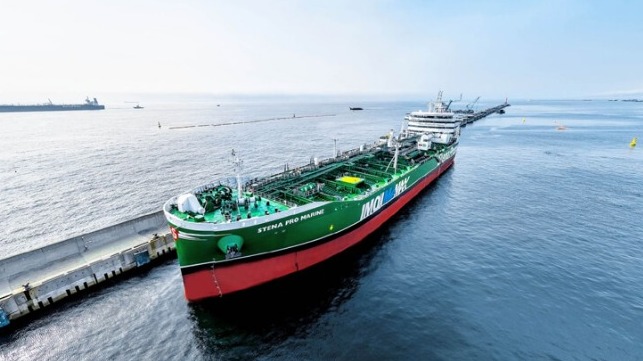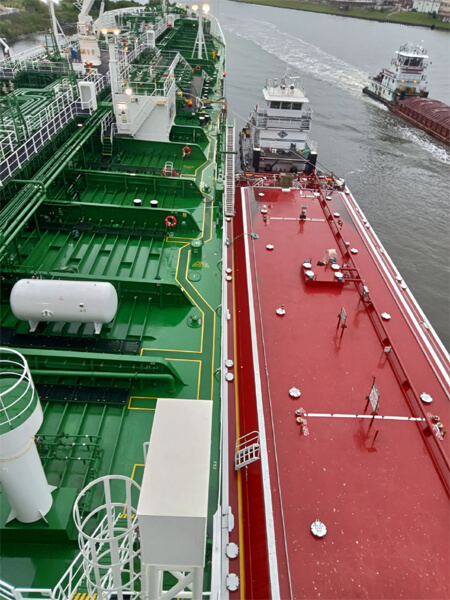First US Gulf Barge-to-Ship Methanol Bunkering Completed in Houston

The first barge-to-ship methanol bunkering on the U.S. Gulf Coast was completed earlier in April and is being hailed as another key step in the development of the infrastructure required for the wider adoption of methanol as a marine fuel. Completed in the Port of Houston, the bunkering came eight months after Stena Bulk completed a similar first barge-to-ship methanol bunkering in the Port of Rotterdam.
The U.S. bunkering was completed in partnership with Kirby Corporation, the largest tanker barge provider in the United States. The Stena Pro Marine and Stena Prosperous were operating under a time charter when they called in Houston transporting clean petroleum products. Stena Pro Marine was bunkered with 1,408 MT of methanol, and Stena Prosperous was refueled with 1,203 MT during the operation.
The companies are highlighting the ease of the bunkering operation, placing the barge alongside each of the tankers. They said it demonstrates the ease and minimal infrastructure requirements associated with methanol as a marine fuel, as well as its widespread availability. Last year, Proman Stena Bulk reported that methanol is already available at over 100 ports worldwide, including at all major bunkering hubs.
“Completing the first barge-to-ship methanol bunkering on the U.S. Gulf Coast is a tremendous achievement for the Proman Stena Bulk joint venture,” said Anita Gajadhar, Executive Director, Marketing, Logistics and Shipping for Proman. “The Port of Houston is a major global cargo hub with significant latent methanol storage capacity. These qualities made it a natural testbed for our first U.S. ship-to-ship bunkering.”
The Port of Houston as a major petrochemicals hub they noted has developed a significant methanol storage capacity. They report Houston has a capacity of more than 275,000 MT of methanol available at the port.
“It was a natural for us,” said Kirby Marine Group President, Christian O’Neil. “We have extensive expertise with methanol as a cargo, with conventional bunkering, and with barge-to-ship lightering of all manner of products. We are committed to remaining a leader in energy transportation, regardless of the form that energy takes.”

NR tankers were refueled with methanol coming from barges in Houston (Proman)
The vessels bunkering are two of the new fleet of six 49,990 dwt methanol tankers built in China and delivered last year to the joint venture between Stena Bulk and Proman and to Proman. Built by Guangzhou Shipyard International, the medium-range tankers were the first methanol dual-fuel tankers built in China and were highlighted for their pioneering design and innovative MAN B&W 6G50ME-C9.6 MW Tier III engines. The vessels are equipped with the latest energy efficiency technology, including continually controlled combustion, optimized tuning, redesigned and aerodynamic hull lines, and an energy shaft generator, reducing fuel consumption and helping to meet strict emissions criteria. The Proman Stena Bulk JV reported that each vessel will use approximately 12,500 tons of methanol each year as a marine fuel.

that matters most
Get the latest maritime news delivered to your inbox daily.
Companies around the world have been working to build the infrastructure to support the use of methanol as a marine fuel and to create the production capabilities for green methanol from sustainable sources such as sustainable bio-mass or renewable energy. Proman highlights that it is investing in its own low-carbon and green methanol production capabilities, including a new 100,000-ton-per-year methanol facility in development in North America. The project is currently being constructed with a target start of operations in 2025. The facility will produce bio-methanol from non-recyclable forestry residues and municipal solid waste and will substantially contribute to the circular economy.
Maersk has taken global leadership in the development of a methanol production and supply network. They have formed partnerships with a broad range of companies and are supporting the development of new technologies ahead of the launch of their dual-fuel methanol containerships. Methanol continues to be viewed as one of the most promising alternative fuels that will contribute to reducing carbon emissions from the maritime industry.
